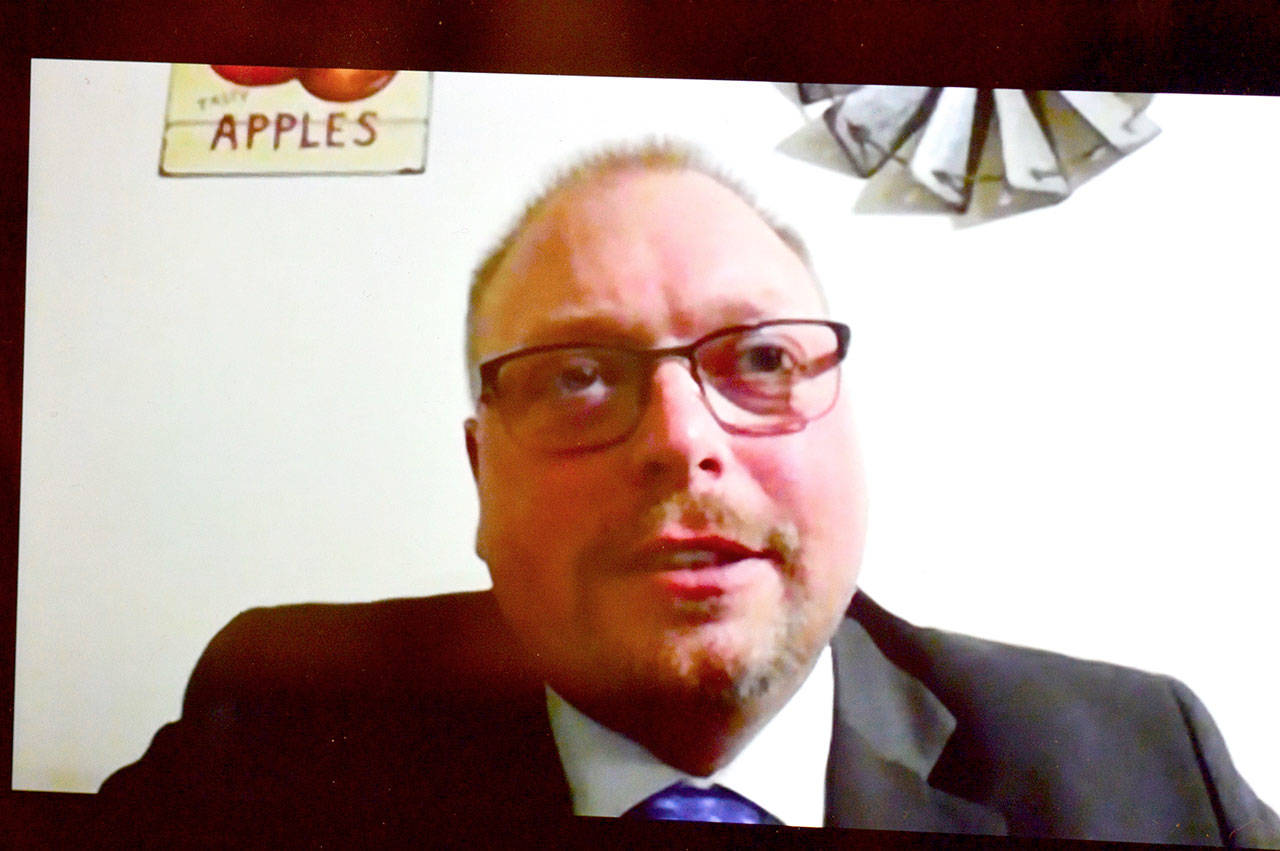PORT TOWNSEND — Race relations, police in schools and the U.S. Capitol riot of Jan. 6 were a few of the topics in a 90-minute Zoom call with four Port Townsend police chief finalists Monday evening.
What took place at the Capitol “was inexcusable, reprehensible and indefensible,” said D.F. Pace, police inspector with the Philadelphia Police Department.
As a law enforcement officer, he said he’s dedicated to protecting free speech, but “when that crosses over to criminal behavior, that’s when your right to free speech ends,” Pace added.
He was responding to questions from local residents who attended the live-streamed event. Hosted by City Manager John Mauro, the meeting drew 45 viewers and provided them with access to the finalists in four breakout rooms.
Mauro urged the audience to complete online surveys on the four finalists, and, pledging to read every word, said he’ll announce his hiring decision in February.
Candidate Joe Harris, chief of police in Mattawa, Grant County, began by noting his city’s large population of undocumented workers and talked about the importance of relationship-building.
If a Latino family is having a party and they invite you to have a taco, “go in and eat a taco. Go in and get to know those people,” Harris said.
When asked about school resource officers, Harris said he urges the two in his department to “think outside the box,” changing into gym clothes and working out with students, shooting hoops, “showing the youth we’re people, too.”
What we all want, he said, is empathy and respect.
“If you get those two things, you’ll reciprocate them back to the person who gave them to you. That’s what I base my leadership model on,” Harris said.
Candidate Mark Daniel is also chief at a small-town police department, in Mt. Angel, Ore. As he introduced himself at the start of the meeting, he said notes aren’t his thing.
“I wanted to go off my heart,” Daniel said. “My wife and I are very excited about joining the community” of Port Townsend.
Lily Haight, an investigator at Jefferson Associated Counsel in Port Townsend, asked Daniel about the policy of cutting back on suspending driver’s licenses for failure to pay fines.
“I’m OK with that,” he said.
“I’ve seen, over my career, people getting deeper and deeper in debt, into a hole they can’t find their way out of. I really like to give people the opportunity to turn things around.”
Haight also asked Daniel’s opinion of drug decriminalization — in general and potentially in Port Townsend.
He responded that, in Oregon, the statute has rolled back possession of small amounts of methamphetamine, heroin or cocaine to an infraction level: a $100 fine plus a referral to a treatment center if the person has no other charges.
“It’ll be interesting to see how it all works,” Daniel said.
Thomas Olson, deputy chief of the University of Washington Police Department, also took questions on enforcement of drug laws, and then spoke about his city’s struggle with homelessness.
“Drugs are decriminalized in Seattle for the most part,” he began. Yet, “if we’re going to tackle the issue of homelessness, we need to tackle the issue of drug addiction. I’m not sure legalizing drugs is going to reduce the amount of addiction.”
Melissa O’Neil, describing herself as a mom and activist, asked all four candidates to give their opinions on implicit bias and racial equity training.
“I work at the UW, a very diverse community. We have everything: culture, nationality, LGBTQ on that campus,” Olson said, adding “there’s nothing more important to the police department than equity.”
Pace, who’d said earlier he’s an immigrant born in Italy, was emphatic in his response. After 16 Philadelphia police officers were disciplined or fired for posting racist comments on social media, Pace was instrumental, he said, in holding them accountable.
“There is no place in social media for an officer to say things that show bias. End of story,” he said.
Near the end of the meeting, Port Townsend City Attorney Heidi Greenwood, in a breakout room with Harris, asked him one last question:
“What is your biggest regret in your career?”
After pausing for a few seconds, Harris said he’d left law enforcement — for just a year — to serve as a civil rights investigator for the state Attorney General’s office.
“I love being a police officer,” Harris said. “I love helping people. I hate bullies; I despise bullies, which is why I became a police officer.”
________
Jefferson County senior reporter Diane Urbani de la Paz can be reached at 360-417-3509 or durbanidelapaz@peninsuladailynews.com.

